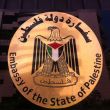(Photo: Emblem on the gate of the Palestinian Embassy in Lebanon. Picture taken by Nora Stel)
The article takes issue with the fact that public authority beyond the state has often been seen as isolated from the state and/or constituting a threat to the state. It contributes to recent scholarship that has started to conceptualize ‘state’ and ‘non-state’ forms of public authority as closely connected and interdependent. The article implements this theoretical shift by means of a qualitative case-study of public authority in Palestinian refugee camps in South Lebanon.
Lebanon’s Palestinian camps are routinely characterized as ‘states-within-the-state’ undermining the sovereignty of the Lebanese state. Yet, the article demonstrates, both a generic state-idea and the specific Lebanese state-system constitute crucial benchmarks for the Popular Committees that govern informal Palestinian settlements. These Popular Committees emulate the Lebanese state institutions they come into contact with to bolster their own authority and they partly do so to be viable interlocutors for Lebanese state institutions.
As such, the Popular Committees’ non-state authority validates rather than challenges state authority in Lebanon and thereby shows how state and non-state authority can be mutually constitutive. This insight has pertinent implications for development agencies, states and transnational organizations, such as the EU and the UN, who often find it problematic to deal with partners that can neither be considered state institutions nor have official status as non-governmental or civil society organisations.
Related news
Blog Ms. Nora Stel
Education and protection of women paramount
‘Dressing up’ up to export: a real option approach to international entrepreneurship
Entrepreneurship in a hybrid political order: the case of Lebanon
Political economy of housing and tenure dynamics
Waste Management and Government in Beirut
Urban security in countries affected by conflict: research mission to Beirut
MSM research on Palestinian refugees presented in Washington DC
Entrepreneurship development in Ethiopia

